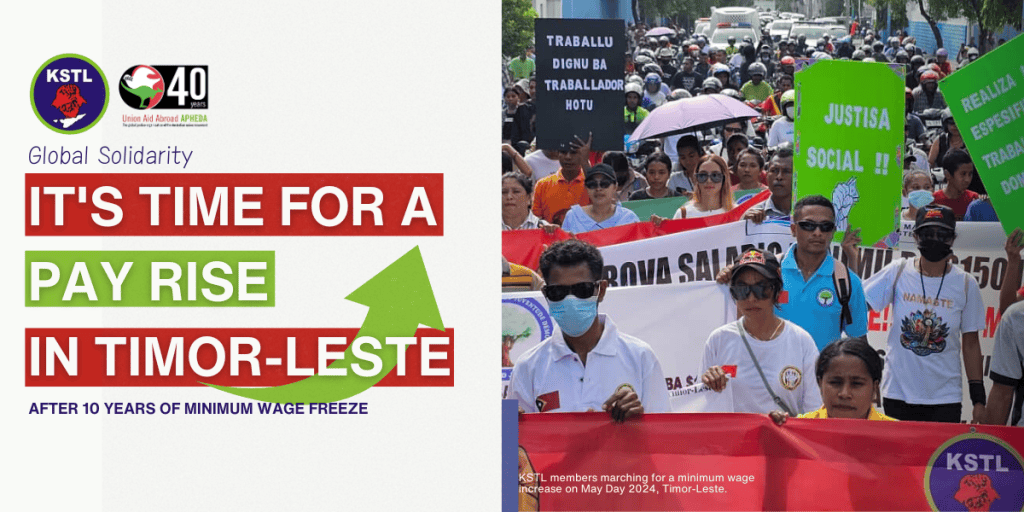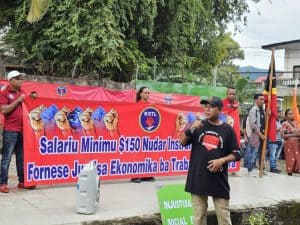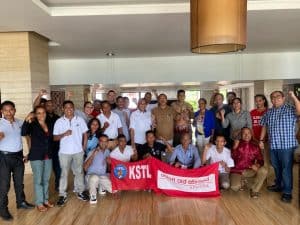
Despite abundant oil and gas resources, Timor-Leste remains one of the poorest countries in the Asia-Pacific region. Still recovering from the COVID-19 induced economic slowdown, many people remain unemployed and 77% of workers are employed in the informal economy.
Cost of living is high and continues to rise. Even within formal work, employers and employees’ knowledge of the labour law is very low, and many workers do not know how to access social security or other protections enshrined in their labour code.
The General Workers’ Union of Timor Leste (SJT-TL) is trying to change this.
Timor-Leste’s largest private sector union, with around 7855 members in the commercial, hospitality, service and construction industries, they lead national campaigns for collective bargaining and minimum wage reform, and support workers to build strong relationships with employers through bipartite agreements.
Over the past year, SJT-TL registered 227 industrial disputes amongst their membership over unlawful dismissal, unpaid wages, poor working conditions, unfair redundancies, incorrect leave entitlements, corruption, lack of contracts and land disputes. With SJT-TL’s assistance, 222 of these cases have been resolved through mediation and conciliation with five cases still in the process of settlement.
Campaigning for a living wage and decent conditions
An urgent priority for Timorese unions is minimum wage reform. Since 2012, Timor-Leste’s minimum wage has remained stagnant at USD$115 a month, despite soaring inflation and overwhelming

Almerio Vilanova, President KSTL and SJT-TL speaking at a minimum wage rally.
evidence advocating for an increase to prevent further impoverishment.
A joint survey with participation of Trade Union Confederation of Timor Leste (KSTL) in 2014 already recommended increasing the minimum salary to USD$200 per month to ensure a decent life for Timorese workers.
After years of negotiations, in April 2024 the Timorese National Labour Council, with representatives from the Government, employers, and unions, reached an agreement to raise the minimum wage to USD$150 per month.
Regrettably, the increase proposal was rejected by the Government. This sets a precedent that will undermine tripartism in the future, especially as it relates to fixing national minimum wages in Timor Leste.
A persistently low minimum wage not only perpetuates continued poverty for low-income workers but also intensifies existing social inequality through a cycle of cheap labour.
In response, the unions and workers have started public demonstrations, including a long march to parliament on May Day, with thousands demanding minimum wage rises, expansion of labour and social protections for domestic workers and Timor-Leste ratify ILO Convention C190 to eliminate gender-based violence in the world of work.
Timorese unions are calling for supporters around the world to show solidarity with their campaign for a minimum wage increase.
Sign their petition and show your support by clicking here
Planning a brighter future for Timorese workers
Given these challenges, Timorese unions recognise the need to work together to ensure that their labour movement is strong, strategic, and organised.

KSTL affiliates participated in a strategic planning workshop
On October 2023, KSTL held their 6th National Congress. Bringing together their affiliates representing around 18,000 workers from across the union movement, delegates committed to work in:
- promotion of the new social contract,
- minimum wage reform
- combatting inflation
- reorganizing weaker union sectors
- accelerating labour law reform and the domestic worker legislation
- gender equality
- eliminating child labour,
- Promoting OHS
- Strengthen collective bargaining and improved dispute resolution mechanisms
- Establishment of municipal-level unions
- Promoting ILO Conventions 87, 98 and 190.
They expressed a strong desire to engage and build upon existing international networks, with the passing of a resolution committing them to strengthening cooperation with the Australian union movement, stating:
“International solidarity is very important to strengthen the existence of [the Timorese union movement] because …resources from membership fees are still too low to enable union life and to develop the [unions]. We are seeking the solidarity of the trade union movement in Australia, especially with the ACTU and APHEDA, to build and develop the KSTL and its members into strong unions in Timor-Leste.”
Building on this long and proud history of international solidarity and collaboration, in March 2024 Union aid Abroad-APHEDA and the International Trade Union Confederation – Asia Pacific (ITUC-AP) co-sponsored a strategic planning workshop for KSTL affiliates.
Each sector-based union mapped out action plans focussed on building and supporting the capacity and long-term sustainability of the Timorese union movement. They came away with a renewed sense of commitment, passion and optimism that, with your ongoing support, will herald a new era of prosperity for Timorese workers.
Union Aid Abroad – APHEDA has worked with the Trade Union Confederation of Timor Leste/Konfederasyon Sindikatu Timor Leste (KSTL) since it was established to fight for workers’ rights.
